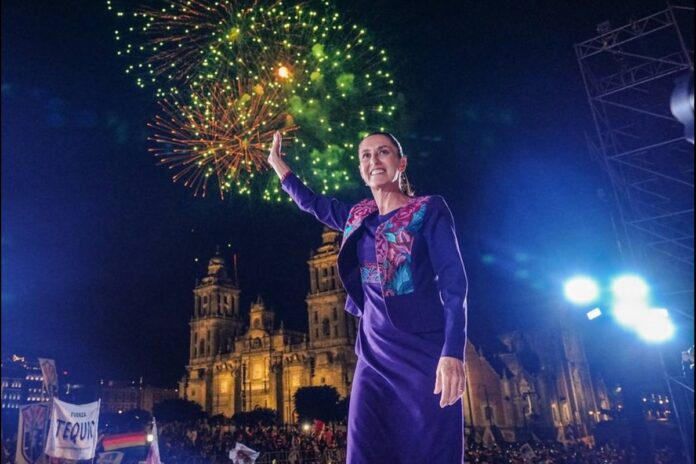Claudia Sheinbaum has been elected as Mexico’s president, making her the first woman to hold the position in the country’s history.
Sheinbaum, a climate scientist and former mayor of Mexico City, received calls from her competitors conceding the election on Sunday night.
Speaking from a downtown hotel, Sheinbaum announced her victory with a smile, expressing gratitude to those who supported her journey. She emphasized the collective effort, attributing her win to the heroines of the past, present, and future. She proudly declared, “I will become the first woman president of Mexico,” reflecting on the significant milestone for the country.
Claudia Sheinbaum highlighted the democratic process in Mexico, affirming the peaceful nature of the elections.
The National Electoral Institute’s president reported Sheinbaum’s lead, securing between 58.3% and 60.7% of the vote. Opposition candidate Xóchitl Gálvez garnered between 26.6% and 28.6%, while Jorge Álvarez Máynez had between 9.9% and 10.8%.
The preliminary tally showed Sheinbaum leading Gálvez by 27 points, with 42% of polling place tallies counted.
Sheinbaum’s campaign focused on continuing the political direction set by President Andrés Manuel López Obrador, her mentor.
Despite a spirited challenge from Gálvez, Sheinbaum led the campaign from start to finish.
President López Obrador congratulated Sheinbaum, acknowledging her wide-margin victory. He remarked on the historic significance, noting she would be Mexico’s first woman president in 200 years. If her lead holds, Sheinbaum’s win would rival López Obrador’s landslide victory in 2018.
Earlier, Gálvez expressed concern about the vote count on social media, urging transparency.
On Monday, President Joe Biden called Sheinbaum to congratulate her on her historic win, praising the successful electoral process.
Both leaders emphasized their commitment to a strong U.S.-Mexico partnership.
Sheinbaum, described by Agence France-Presse as a dedicated leftist known for her calm demeanor, is the granddaughter of Bulgarian and Lithuanian Jewish migrants. Unlike López Obrador, Sheinbaum is considered a mainstream leftist, likely to be less ideological.
Pamela Starr from the University of Southern California noted that Sheinbaum is not a populist but a mainstream leftist politician.
Sheinbaum may not enjoy the same unwavering devotion as López Obrador, though both belong to the Morena party.
In Mexico City’s Zocalo, Sheinbaum’s lead did not initially draw large celebratory crowds. Fernando Fernández, a chef, hoped for a Sheinbaum victory but acknowledged the challenges ahead. He expressed a desire for Sheinbaum to address issues López Obrador couldn’t, like gas prices and crime.
Itxel Robledo, a business administrator, hoped Sheinbaum would bring professionalism to governance. Meanwhile, Yoselin Ramírez voted for Sheinbaum but diversified her vote in other races to ensure balanced representation.
Main opposition candidate Gálvez, a tech entrepreneur and former senator, focused her campaign on security issues, promising a tougher stance on organized crime.
Nearly 100 million people were registered to vote, but turnout seemed lower than in past elections. Voters also elected governors in nine states and numerous local officials.
The election served as a referendum on López Obrador, whose tenure saw expanded social programs but persistent cartel violence. Morena, López Obrador’s party, holds a majority in Congress and most governorships. Mexico’s constitution prohibits presidential reelection.
Sheinbaum promised to continue López Obrador’s policies, including universal pensions and youth apprenticeship programs. Gálvez, from a poor background, campaigned against López Obrador’s “hugs not bullets” policy, pledging a more aggressive approach toward criminals.


